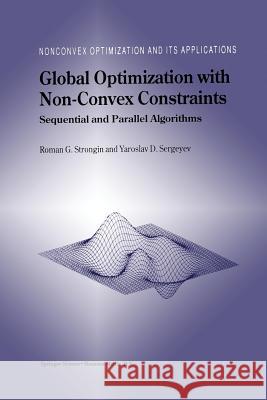Global Optimization with Non-Convex Constraints: Sequential and Parallel Algorithms » książka
Global Optimization with Non-Convex Constraints: Sequential and Parallel Algorithms
ISBN-13: 9781461371175 / Angielski / Miękka / 2013 / 704 str.
Global Optimization with Non-Convex Constraints: Sequential and Parallel Algorithms
ISBN-13: 9781461371175 / Angielski / Miękka / 2013 / 704 str.
(netto: 577,76 VAT: 5%)
Najniższa cena z 30 dni: 578,30
ok. 16-18 dni roboczych.
Darmowa dostawa!
Everything should be made as simple as possible, but not simpler. (Albert Einstein, Readers Digest, 1977) The modern practice of creating technical systems and technological processes of high effi.ciency besides the employment of new principles, new materials, new physical effects and other new solutions ( which is very traditional and plays the key role in the selection of the general structure of the object to be designed) also includes the choice of the best combination for the set of parameters (geometrical sizes, electrical and strength characteristics, etc.) concretizing this general structure, because the Variation of these parameters ( with the structure or linkage being already set defined) can essentially affect the objective performance indexes. The mathematical tools for choosing these best combinations are exactly what is this book about. With the advent of computers and the computer-aided design the pro- bations of the selected variants are usually performed not for the real examples ( this may require some very expensive building of sample op- tions and of the special installations to test them ), but by the analysis of the corresponding mathematical models. The sophistication of the mathematical models for the objects to be designed, which is the natu- ral consequence of the raising complexity of these objects, greatly com- plicates the objective performance analysis. Today, the main (and very often the only) available instrument for such an analysis is computer- aided simulation of an object's behavior, based on numerical experiments with its mathematical model.











